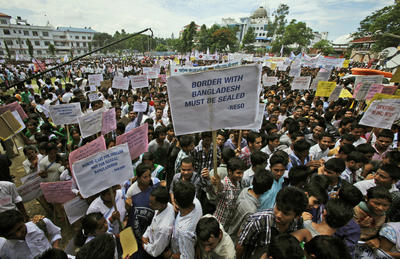The protesters braved the lathis (truncheons/sticks) of the Delhi police to demand improvement in women’s rights. The fact that the emerging middle class is losing patience with the nonchalant approach of the ruling classes to India’s problems is a positive sign.
But there is one disturbing trend: the middle class, whose voice gets stronger by the day, is either ignorant on issues of foreign policy or excessively hawkish in its views. This is especially true of the public’s view of India’s neighbours. The common refrain is that India can live without its neighbours, and should stop handling diplomatic relations with them delicately and tactfully.
On foreign policy, at least, the Indian public is misguided. The current Indian government and governments before it have correctly understood that India cannot grow without mending fences with its neighbours.
The hawkishness and jingoism of the urban middle classes were reflected by irresponsible statements made by members of both the ruling Congress Party and the opposition Bharatiya Janata Party as they responded to the death of Lance Naik Sudhakar Singh, who Pakistani forces apparently beheaded. Anti-corruption crusader Anna Hazare was not far behind, who called for war against Pakistan.
Many commentators argue that increasing anger in large sections of India’s middle class — especially the youth — is due to repeated terrorist acts against India emanating from Pakistani soil. But this does not explain why Indian public opinion is also not very favourable to other neighbours like Bangladesh, Nepal and Sri Lanka. There is no doubt that anti-Pakistan feelings increased in the aftermath of the Mumbai attacks of 2008. But there are other factors at play.
While the Indian establishment has tried to keep things calm, 24-hour electronic media channels have been excessively jingoistic. The news media play a crucial role in shaping the opinions of the Indian public, especially the urban middle class. They are quick to dismiss any sort of dialogue with Pakistan as a wasteful exercise that will pay no dividends. The media is hypocritical on this issue. For example, The Times of India, together with a Pakistani media group, runs a campaign for peace called ‘Aman Ki Asha’ (Hope for peace), but its television subsidiary is used derisively to mock peace initiatives.
Coverage of Bangladesh is no better. Indian media hardly ever mention overtures toward India by the current Sheikh Hasina regime, preferring instead to look at Dakha through a narrow security lens. Issues such as Bangladeshi migration are looked at as a security threat to India. Immigrants from Bangladesh were blamed almost exclusively for the Kokrajhar clashes, for example, as few channels tried to look at the issue dispassionately or in a nuanced manner. Just as India’s electronic media ignores positive changes in Pakistan’s civil society, it disregards positive economic, social and political changes in Dhaka.
The editorial choices of media channels are one thing, but some of the blame should also rest on panelists on television. Many programs invite retired army officials or ex-diplomats on to incite public outrage against India’s neighbours. Other irresponsible talking heads include short-sighted members of the strategic community, who find an audience through television and newspapers. A large number of these individuals are retired army officers who cannot let go of the baggage of the past and have a very narrow world view. The popularity of their opinions does no favours to India’s foreign policy.
The Indian media and even think-tanks rely on former members of India’s intelligence agencies for their views of the neighbourhood. This naturally leads to a very skewed understanding of the neighbourhood.
While the strategic community has to factor in defence issues, India’s foreign policy cannot be based only on a security perspective. The views of economists and social scientists also need to be factored in. India’s middle class must realise that while for the time being it can survive in an unstable neighbourhood, in the long run this is impossible. Reaching out to the neighbours is not a favour to them but to India’s future.
Tridivesh Singh Maini is a New Delhi based columnist and independent foreign policy analyst.


The increase in the anger of Indian youth is also because they have been suppressing it for a long time and now have finally woken up. They now need a good control of their lives instead of the politicians or people in power controlling them.
Who cares about increase in Indian youth anger? Indian youth better understand that India itself will be at an advantage by bettering its relations with neighbours. If your show too much arrogance and super-duper confidence in yourselves,you are at loss